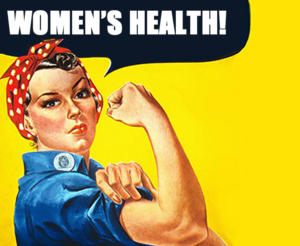Women’s History Month is a great time to reflect on progress that has been made in women’s health
 The landmark 1985 Report of the Public Health Service Task Force on Women’s Health Issues began what has been a decades-long improvement in women’s health.
The landmark 1985 Report of the Public Health Service Task Force on Women’s Health Issues began what has been a decades-long improvement in women’s health.
For example, prior to the report, only about 60% of mothers breastfed, while today nearly 80% do. The teen birth rate stood at 51.0 per 1,000 teenage girls, which has dropped to 29.4 per 1,000 teenage girls today.
Despite these advances, minority women still face more barriers to healthcare than white women. For example, black women are less likely than white women to get breast cancer, but 40 percent more likely to die if they do develop it. According to the Black Women’s Health Imperative, black women are 3–4 times more likely to die from pregnancy-related complications than White women.
Obstacles, referred to as the social determinants of health, reduce minority women’s access to healthcare. These factors include:
- Socioeconomic factors: Minority women are more likely to experience poverty and have lower incomes, making healthcare services less affordable and accessible. Lack of health insurance or underinsurance can also limit their ability to seek medical care. (NHA accepts most insurances, including Medicare and Medicaid.)
- Discrimination and bias: Minority women may encounter discrimination and bias from healthcare providers, which can lead to disparities in treatment and access to services. This can result in lower quality care and mistrust of the healthcare system.
- Language barriers: Limited English proficiency can create challenges in accessing healthcare services for minority women, as they may struggle to communicate with healthcare providers or understand medical information. (NHA provides translators at our clinics and a language service for those languages we do not have a translator for.)
- Limited health literacy: Minority women may have lower health literacy levels, making it difficult for them to understand health information, navigate the healthcare system, and make informed decisions about their health. (NHA appointments have time for questions and explanations built into each appointment.)
NHA works each day to remove these obstacles through our efforts to provide quality healthcare that reduces discrimination and bias in healthcare, providing culturally competent care training for healthcare providers, improving access to language interpretation services, community-based outreach programs, and initiatives to improve health literacy among minority women.
10 Ways You Can care for Yourself this Women’s History Month
At NHA, we also believe the patient is our partner is their own healthcare. As a woman, caring for your health involves a holistic approach that addresses physical, mental, and emotional well-being. Here are some important steps a woman can take to care for her health:
- Regular check-ups: Schedule regular visits with your healthcare provider for screenings, vaccinations, and preventive care. These visits can help detect any health issues early and prevent future problems.
- Healthy diet: Eat a balanced diet rich in fruits, vegetables, whole grains, lean proteins, and healthy fats. Limit intake of processed foods, sugary drinks, and excessive amounts of sodium and saturated fats.
- Exercise regularly: Engage in regular physical activity to maintain a healthy weight, improve cardiovascular health, boost mood, and reduce the risk of chronic diseases such as diabetes and cancer.
- Manage stress: Find healthy ways to cope with stress, such as practicing relaxation techniques, meditation, yoga, or spending time with loved ones. Chronic stress can negatively impact both physical and mental health.
- Get enough sleep: Aim for 7-9 hours of quality sleep per night. Poor sleep can affect mood, cognitive function, and overall health. Establish a regular sleep schedule and create a relaxing bedtime routine.
- Practice safe behaviors: Use protection during sexual activity to prevent sexually transmitted infections (STIs) and unintended pregnancies. Avoid smoking, limit alcohol intake, and never use illicit drugs.
- Maintain mental health: Prioritize mental health by seeking support from friends, family, or a mental health professional when needed. Practice self-care activities and develop healthy coping mechanisms for dealing with challenges.
- Stay informed: Stay informed about health issues relevant to women, such as breast health, reproductive health, menopause, and hormone replacement therapy. Educate yourself about your own body and any specific health risks you may face.
- Perform self-examinations: Conduct regular self-examinations for breast and skin changes. Being aware of changes in your body can help detect any abnormalities early on.
- Seek preventive care: Stay up-to-date with recommended screenings and vaccinations, such as mammograms, Pap smears, HPV vaccines, and bone density tests. These preventive measures can help detect and prevent serious health conditions.
Remember that it’s essential to listen to your body and prioritize your individual health needs. If you have any concerns or questions about your health, don’t hesitate to contact your NHA provider!